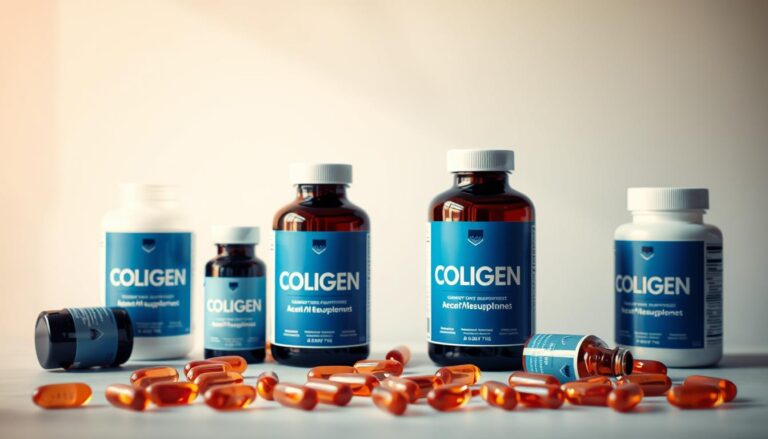When you take collagen supplements matters a lot. Your body uses it better at certain times. Experts say you should take 15g of collagen daily for the best results. But, what’s the best time to do it?
By age 25, your body starts losing collagen, especially type I. This is the protein found in your skin, bones, and tendons. Losing it leads to wrinkles and brittle nails. But, taking collagen regularly for 56 days can improve your skin’s elasticity and collagen levels.
Key Takeaways
- Type I and III collagen account for 80% of skin structure, starting to reduce after age 25.
- Up to 15g of daily collagen supports skin, joints, and muscle health.
- Consistent use for 56 days enhances dermal collagen density.
- Glycine in collagen aids sleep by lowering core body temperature.
- Timing choices depend on goals like weight management or post-workout recovery.
Understanding Collagen and Its Functions in the Body
Collagen is the most common protein in our bodies, making up about 30% of our total protein. It’s found in our skin, bones, and connective tissues. It helps keep our skin elastic and our joints strong.
What is Collagen and Why is it Important?
Collagen is made of amino acids like glycine, proline, and hydroxyproline. These amino acids form a network that keeps our tissues strong. For example, Type I collagen, which makes up 90% of our collagen, helps strengthen our skin and bones.
As we age or get more sun, our collagen levels drop. This can cause wrinkles and stiff joints. But, studies show that taking supplements like Vida Glow’s marine collagen can improve skin elasticity by 22% in just 8 weeks.
Types of Collagen Supplements Options
There are different types of collagen supplements, depending on their source and structure. Marine collagen, from fish, is good for the skin. Bovine collagen, from cows, is better for bones. You can find supplements in various forms:
- Hydrolyzed collagen peptides (easily absorbed)
- Gelatin (used in cooking)
- Liquid blends (for convenience)
Collagen Absorption and Utilization
When we take collagen supplements, our body breaks them down into smaller peptides. These peptides are then absorbed into our bloodstream. They help deliver amino acids to our joints and skin.
A 14g serving of collagen powder gives us 12g of protein. This helps with muscle repair and keeping our skin hydrated. Studies show that taking 2.5–15g of collagen daily can make our skin firmer in just 8 weeks.
| Component | Per 14g Serving |
|---|---|
| Calories | 50 |
| Protein | 12g |
| Calcium | 29mg |
| Sodium | 44.9mg |
While collagen supplements are generally safe, people with shellfish allergies should avoid marine-based products. Always talk to a healthcare provider before starting any new supplements.
The Best Time to Take Collagen for Maximum Benefits
There’s ongoing debate about the optimal time for collagen intake. Yet, studies show no clear collagen timing effectiveness advantage for any hour. The focus is on consistent use, not strict timing.
Whether you take it in the morning, noon, or night, the goal is to make it a daily habit. This ensures you get the most out of your collagen supplement.

- Take hydrolysed collagen powder with water for better absorption.
- Pair with vitamin C-rich foods to boost collagen synthesis.
- Use the collagen supplement schedule that fits your lifestyle—coffee, smoothies, or post-workout shakes all work.
Some think taking collagen on an empty stomach boosts absorption. But, the evidence is still out. A small study found better sleep after evening doses.
Others believe pre-workout intake aids in muscle repair. Yet, no single time is proven best for everyone. The most important thing is to find a routine that works for you.
For example, adding it to your morning coffee can help you stay consistent. The body absorbs collagen at a steady rate throughout the day. So, choose a time that feels right for you.
Morning vs. Evening: Comparing Collagen Consumption Timing
Choosing between morning and evening for collagen intake depends on your habits. Collagen works best when you use it regularly, not just at a certain time.
Benefits of Taking Collagen in the Morning
Starting your day with collagen can be great. You can mix it into coffee or smoothies for a nutritious breakfast. This timing might help your body absorb it better, thanks to its active metabolism.
Collagen’s proline and glycine help your skin and joints. It’s a good choice for your morning routine. Brands like Vital Proteins make it easy to add to your day with powders or Waters™.
- Pair with coffee or oatmeal for a quick boost
- Enhances skin hydration when taken early in the day
- Aligns with collagen’s role in tissue repair and maintenance
Advantages of Evening Collagen Supplementation
Evening collagen intake has its own benefits. It supports your body’s repair work while you sleep. Glycine in collagen can help you relax and sleep better.
Some people take it before bed and use it in their skincare routine. This makes it a part of their evening routine.
- Supports muscle repair after daily activity
- Glycine may reduce insomnia symptoms
- Easy to mix into evening tea or nighttime snacks
Consistency Matters More Than Specific Timing
Studies show collagen absorption doesn’t depend on when you take it. It’s the regular use that matters. The Collagen Calculator™ by Vital Proteins helps you find the right amount for your goals.
Here are some tips for success:
- Choose a time that fits your schedule to avoid missed doses
- Pair with vitamin C-rich foods for synergistic effects
- Track progress over 8-12 weeks to evaluate effectiveness
The best time for collagen is when you can stick to it. Whether it’s with your morning coffee or before bed, being consistent is key. This ensures your body gets the amino acids it needs.
Factors That Influence Optimal Collagen Timing
Optimal collagen timing depends on collagen timing factors unique to each individual. These variables help tailor a personalized collagen routine to align with health goals and lifestyle.
Your Specific Health Goals
Health objectives like skin repair or joint support shape timing choices. For skin benefits, pairing collagen with vitamin C-rich foods enhances absorption. Joint-focused regimens may pair doses with workouts to aid recovery.
Research shows 2.5 grams daily supports joints, while higher doses (up to 15g) target muscle mass.
Type of Collagen Supplement

Hydrolyzed forms like Vida Glow Natural Marine Collagen dissolve easily, making them ideal in coffee or smoothies. Powder forms offer flexibility, while pills are convenient for on-the-go use. Heat-stable options like Vida Glow’s can be added to hot beverages without losing potency.
Dietary Considerations and Interactions
Collagen can be taken with or without food. Some prefer it with meals to reduce stomach sensitivity, while others take it on an empty stomach for faster absorption. Pairing with vitamin C (e.g., citrus) boosts collagen synthesis.
Collagen with food choices should align with digestion preferences and nutrient timing.
Age and Individual Metabolic Factors
Age impacts collagen production: by 40, levels drop to 70% of peak levels. Older adults may need higher doses or split servings to counteract natural decline. Metabolic differences also play a role—those with faster metabolisms might benefit from morning doses, while others prioritize consistency over rigid timing.
Conclusion: Creating Your Personalized Collagen Routine
Starting a personalized collagen plan means knowing what you want to achieve. You might want better skin, stronger joints, or faster recovery after working out. The key is to match your collagen intake with your daily activities.
Experts say to take 2.5–15 grams of collagen each day, best with meals for better absorption. If you’re looking to build muscle, taking it before or after exercise can help. For skin, you might see improvements in 8–16 weeks with regular use.
Being flexible is important. You can mix collagen into your coffee, smoothies, or even baked goods. This makes it simple to stick to your collagen plan. If you’re sensitive to digestion, take it with food to avoid stomach issues. Athletes might find it helpful to take it before working out to reduce soreness.
The most important thing is to be consistent. Taking collagen regularly for 90 days is key to seeing results. It’s a big part of what makes up your body’s protein. By adjusting your intake to fit your lifestyle and goals, you can support your health without adding stress to your day.
FAQ
When should I take collagen supplements for the best results?
There’s no single best time for collagen. Some like it in the morning, others at night. It really depends on your schedule and health goals.
What is the difference between hydrolyzed collagen and collagen peptides?
Hydrolyzed collagen and collagen peptides are broken-down collagen. They’re easier to absorb. Marketers often use these terms interchangeably.
Can I take collagen with my meals?
Yes, you can take collagen with meals. But, adding vitamin C foods can boost its skin benefits. Some prefer an empty stomach for quicker absorption.
How long does it take to see results from collagen supplementation?
You might see results in 4 to 8 weeks. It depends on your age, health, and diet.
Does collagen supplementation have any side effects?
Most people find collagen safe. But, some might get digestive issues or allergies. Always check with a doctor if you’re unsure.
How much collagen should I take per day?
Daily doses are usually 2.5 to 15 grams. This range lets you adjust based on how your body reacts.
Are there specific types of collagen that are better for skin or joints?
Type I is great for skin. Type II is best for joints. Mixing both can offer overall benefits.
How does collagen interact with other supplements?
Collagen works well with vitamin C. It’s also safe with other supplements. But, be careful with digestive health supplements.
Does age affect how I should take collagen?
Yes, older adults need more collagen. It helps with skin, joints, and energy.

